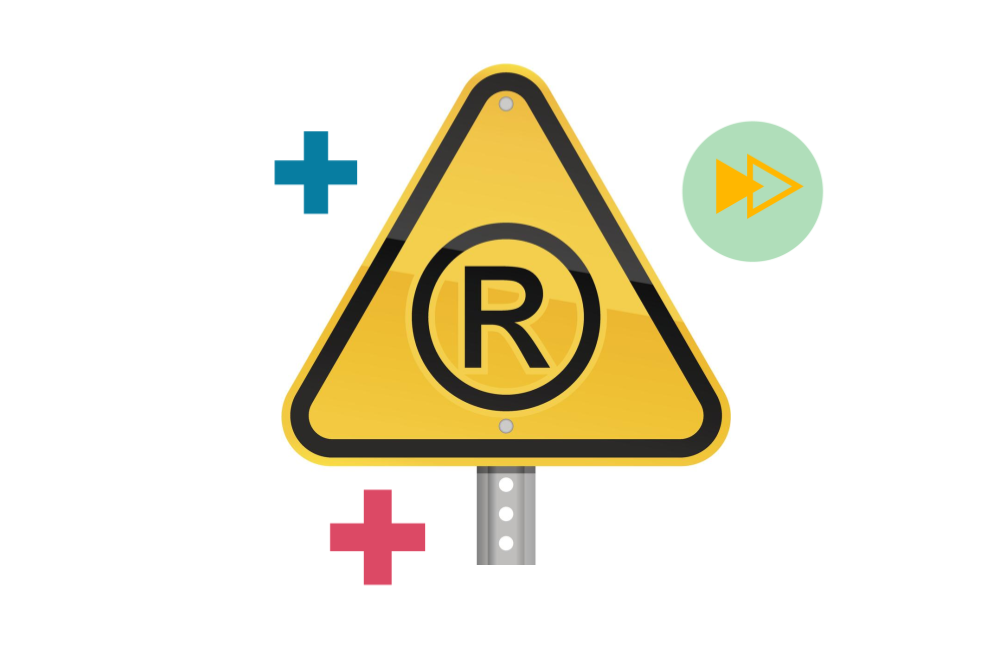
Author Matt Sammon
The process of registering your trade mark gives you exclusive rights to deal in that trade mark, and to prevent others from doing so. In this article we will take a look at what you can register as a trade mark, the benefits of doing so and the process and requirements on how to register a trade mark. Whilst this blog focuses on the UK trade mark registration process and requirements, it’s worth noting that many foreign countries apply the same criteria.
How to identify your brand’s important trade marks
You can identity your trade marks by answering a few simple questions, such as; what is your badge of origin? how do your customers know and identify you? how do they spot your product on the shop shelves, or identify your service offering from those of your competitors? Is it a name, a logo, a shape, a sound? Whatever it is, that’s your trade mark.
Why register a trade mark?
The most obvious reason to register a trade mark is to prevent a competitor using it, or something similar, to drive traffic to their own goods or services, or to confuse your loyal clients into buying their products or services instead of yours. Once your trade mark is registered it is protected from this unsavoury behavior that can damage your business’ sales and reputation.
For the relatively minimal cost and low administrative burden involved in the registration process, the owners of a registered trade mark secure a strong registered right which is easy defend. A trade mark registration is your flag in the ground, marking out your territory from those of your competitors, and serves as a warning to your competitors and consumers alike that you are serious about protecting your position.
The risks of un-registered trade marks
In the UK, it is possible to rely on unregistered trade marks to take action against third parties, however reliance on rights that have not been registered requires that you are able to demonstrate a goodwill in the sign in the UK. The only way to establish this goodwill is through the filing of, extensive evidence, which is not only time consuming and a huge administrative burden, but also a costly exercise, which is by no means guaranteed to succeed. You will also be required to demonstrate, again through the filing of masses of evidence, that unauthorised use of your sign would constitute a misrepresentation to consumers. A small trade mark registration cost can save a huge amount of effort and cost later down the line.
What can register as a trade mark?
Whilst trade marks are most commonly words or logos (think ADIDAS or the Nike “swoosh”), these are by no means the only protectable forms of trade mark. With recent changes in the law regarding the format of a registered trade mark, it is now possible to apply to register almost anything as a trade mark including sounds, holograms and moving images.
There are however certain requirements that the sign must fulfil before it qualifies for registered protection. Those requirements are generally defined in relation to the goods or services for which you are seeking protection and exist to ensure that your chosen sign is capable of acting as a badge of origin, and to protect traders from unfair trade mark registrations which would block normal, everyday use.
Top considerations are to ensure that your chosen trade mark is not descriptive or non-distinctive in respect of your target market. By this, we mean, the sign may not simply describe the goods or services concerned, and must not be indicative of a feature of the goods or services, for example the quality, quantity or intended purpose of the products. Examples here would be the word CLEAN for use in respect of soap products, or WARM for use in respect of jumpers; not only would a registrations for these types of words prevent legitimate use within the trade, but members of the public are unlikely to view these types of words as indicating origin, and are much more likely to view them as simple descriptors.
There are numerous other considerations relating to commonly used language, the nature of goods themselves, public policy and morality, misleading nature, and protected emblems. If you are unsure about your chosen trade mark, you should consult an IP specialist who will be able to advise you further.
Conduct a trade mark search to check availability
As well as objections based around the sign itself, consideration must also be had for whether or not your chosen sign conflicts with any other third party right already in existence. Is your chosen sign identical or closely similar to an earlier sign in respect of identical or similar goods and services? Whilst the UK office will not prohibit the registration of such a sign, third parties may raise objections to your application on these grounds, and successful oppositions will prevent the registration of your chosen sign, and may result in further legal action.
Taking the time to consider all of these factors at the outset will ensure that you choose a trade mark which is both capable of, and free for, registration.
How to register a trade mark in the UK
How you go about the trade mark registration process is likely to have a direct impact on the success or failure of the application. You should always seek advice before proceeding with an application – a good trade mark attorney will be able to guide you through the maze of the requirements and will be able to discuss any potential problems of your chosen sign with you. He or she will be able to advise you on the correct coverage and scope of protection to ensure that you are actually getting the coverage that you think you are getting.
Your trade mark attorney will also be able to advise on any other issues which may arise, for example who designed your sign, and does this attract any copyright ownership issues, and whether any other form of protection, such as design protection, would help to solidify your rights. He or she will also be able to conduct trade mark searches of the relevant registers to ensure that your application will not meet with third party obstacles throughout the process. Furthermore, your attorney will be able to discuss additional territorial protection and the best routes for obtaining protection overseas. Read our recent guide for tips and recommendations on how to choose the right advisor for you.
The UK trade mark application process
The registration process in the UK is relatively simple and cost effective. Once your application has been filed at the UKIPO containing all required details, the application will face examination to determine its acceptability for registration, followed by a publication period during which others may file opposition against the application if they believe your trade mark should not be registered.
Provided you have taken the advice of a trade mark attorney prior to filing, you should not meet any problems at these stages, or you will at least be aware of the potential for problems which your attorney would have discussed with you.
Provided no obstacles arise, or any obstacles are successfully overcome, your trade mark will progress through to registration, and the UKIPO will issue a trade mark registration certificate. You are then the proud owner of a trade mark registration, an incredibly powerful right that you can use to prevent unauthorised use of your trade mark.
Foreign protection of trade marks
We recommend you discuss the issue of foreign protection with your trade mark attorney as early as possible, he or she will be able to advise on the best possible course of action for securing protection in the additional geographical territories of interest to you. For example, you may wish to make use of the priority period – an international system which allows applicants to delay foreign filings for a period of six months, perhaps for the purpose of spreading the cost or for market research purposes – but which allows you to benefit from your original filing date.
In addition, your trade mark attorney will be able to advise on the most administratively concise and financially effective method of securing overseas protection. There are numerous international systems and methods for securing overseas rights, including foreign national applications, unitary systems such as the EU Trade Mark filing system, or pick and choose multi-filing systems, all of which have different benefits, and a good trade mark attorney will be an expert in them all.
Managing your trade mark effectively
Once registered, your UK trade mark will last for an initial period of 10 years, and is renewable for continuous 10 year periods upon payment of the appropriate renewal fee.
As well as making sure that you attend to payment of the renewal fee at the correct time, you will need to take good care of your trade mark registration; you will need to make good use of your trade mark to ensure that it does not become vulnerable to a non-use attack, and you will need to actively monitor both internal and external use of your trade mark to ensure that there is no unauthorized or infringing use of the sign, or that where the use is authorised, the sign is used in the correct manner, that the trade mark is not used in any offensive or inappropriate manner, and that your sign is always clearly used as a trade mark, indicating the origin of your products or services and not as a descriptor.
Establish your trade mark rules
It is important to monitor both the offline and online realms, including competitor and third party sites, and also social media usage. Your trade mark attorney will be able to provide further advice in respect of the correct use of trade marks, and will be able to advise on the preparation of suitable brand guidelines detailing the requirements for third party use of your trade mark.
How to use your registered trade mark
Once registered, you will have a valuable right that not only provides you with a solid starting point for preventing unauthorised use of your sign, but also provides you with a valuable item of property which can be dealt with in the same manner as a physical item of property – the registered trade mark will add significant value to your business, forming part of any future valuation, and can be traded, for example, licensed to third parties to generate income, or can be sold to third parties either independently, or as part of a larger business sale.
As long as you take good care of your trade mark registration, it will serve to protect and preserve your place in the marketplace, ensuring that your customers can enjoy and love your products and services for years to come, safe in the knowledge that they know what they are getting. It will provide you with a strong basis from which you can control and prevent the use of your trade mark, and will add value and status to your business. Obtaining a trade mark registration is well worth the minimal initial cost and effort, and most certainly ensures that you preserve your place in the market for years to come.
We create real IP value
From the everyday to the IP emergency, our accomplished Chartered Trade Mark Attorneys and IP Solicitors are driven to get the very best outcome for every brief for every client, every time! Sonder & Clay are a full service IP law firm with proven expertise and results in IP protection, strategy, disputes, and exploitation. Learn more about our IP services or get in touch with us for a complimentary IP audit today.


